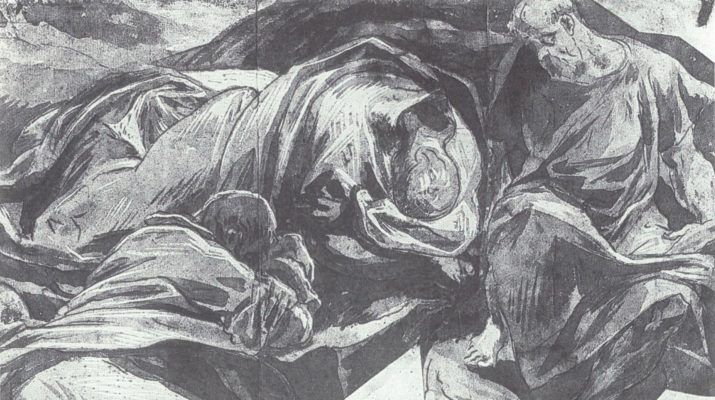Matthew 26:36-38
Narrative Lectionary 113
36 Then JesusA wentB with them to a placeC calledD Gethsemane,E
A “Jesus” = Iesous. From Hebrew Yehoshua (Joshua, the Lord is salvation); {from YHVH (proper name of the God of Israel; the self-existent and eternal one); {from havah (to become) or from hayah (to come to pass, become, be)} + yasha (to deliver, defend, help, preserve, rescue; properly, to be open, wide or free, which implies being safe. So, in a causative sense, this is to free someone)}. This is Jesus or Joshua in Greek – the Lord saves or the Lord is salvation.
B “went” = erchomai. This is to come or go.
C “place” = chorion. 10x in NT. From chora (space, land, region, fields, open area); from chasma (gap, gulf, chasm, open space); from chasko (to gape, yawn). This is place, estate, possession, piece of ground, property.
D “called” = lego. This is to speak, say, name, call, command. It is generally to convey verbally.
E “Gethsemane” = Gethsemani. 2x in NT. From Hebrew gath (wine press); {perhaps from nagan (to strike a stringed instrument, to pluck or play it)} + shemen (fat, oil, grease, olive oil – often with perfume; figurative for fertile, lavish, rich); {from shamen (to shine, which implies being oily, growing fat)}. This is Gethsemane, meaning oil-press, an olive orchard.
and he said to his disciples,F “SitG here while I goH over there and pray.”I
F “disciples” = mathetes. From matheteuo (to make a disciple of); from manthano (to learn key facts, gain knowledge from experience; generally implies reflection as part of the learning process); from math– (thinking things through). This is a disciple, learner, or student. It is where we get “mathematics” from.
G “sit” = kathizo. From kathezomai (to sit down, be seated); {from kata (down, against, according to, among) + hezomai (to sit); {from aphedron (a seat, a base)}}. This is to sit, set, appoint, stay, rest.
H “go” = aperchomai. Related to “went” in v36. From apo (from, away from) + erchomai (see note B above). This is to depart, follow, or go off in a literal or figurative sense.
I “pray” = proseuchomai. From pros (advantageous for, at, toward) + euchomai (to wish, make a request, pray). This is to pray or pray for, to worship or supplicate. It is more literally exchanging one’s own wishes for God’s.
37 He took withJ him PeterK and the twoL sonsM
J “took with” = paralambano. From para (beside, by, in the presence of) + lambano (active acceptance/taking of what is available or what has been offered; emphasizes the choice and action of the individual). This is to receive, take, acknowledge, associate with. It can also mean to take on an office or to learn.
K “Peter” = Petros. Related to petra (large rock that is connected and or projecting like a rock, ledge, or cliff; can also be cave or stony ground). This is Peter, a stone, pebble, or boulder.
L “two” = duo. This is two or both.
M “sons” = huios. This is son, descendant – a son whether natural born or adopted. It can be used figuratively for other forms of kinship.
of ZebedeeN and beganO to be grievedP and agitated.Q
N “Zebedee” = Zebedaios. Related to “Jesus” in v36. 12x in NT. From Hebrew zebadyah (Zebadiah, “The Lord has bestowed”); {from Zabad (to bestow, confer, endure) + Yah (God, the Lord; a shortening of the sacred name of the God of Israel); {from YHVH (see note A above)}. This is Zebedee, meaning “the Lord has bestowed.”
O “began” = archomai. From archo (to rule, begin, have first rank or have political power). This is to begin or rule.
P “grieved” = lupeo. From lupe (pain, whether physical or mental; grief, sorrow, distress, a heavy heart). This is to be sad, grieve, distress, hurt, feel pain. It can be used for deep pain or severe sorrow as well as the pain that accompanies childbirth.
Q “agitated” = ademoneo. 3x in NT. Perhaps from adeo (to be full to the point of loathing). This is being distressed, troubled, fearful, lacking courage.
38 Then he said to them, “My soulR is deeply grieved,S even to death;T remainU here, and stay awakeV with me.”
R “soul” = psuche. From psucho (to breathe, blow). This is breath, the breath of life, the self, individual, soul. This is the word for that which makes a person unique – their identity, will, personality, affections. This isn’t the soul as the immortal part of us, but as our individuality. It is also not life as a general concept, but specific to people. This is where the words psyche and psychology come from.
S “deeply grieved” = perilupos. Related to “grieved” in v37. 5x in NT– including 2x when Jesus prays in Gethsemane in Matthew and Mark. From peri (about, concerning, all around, encompassing) + lupe (pain, whether physical or mental; grief, sorrow, distress, a heavy heart). This is very sorrowful, deeply grieved.
T “death” = thanatos. From thnesko (to die, be dead). This is death, whether literal or spiritual. It can also refer to something that is fatal.
U “remain” = meno. This is to stay, remain, wait, await, continue, abide, endure. It can mean to literally stay in a place or to remain in a condition or to continue with hope and expectation.
V “stay awake” = gregoreo. From egeiro (to awake, raise up or lift up; to get up from sitting or lying down, to get up from sleeping, to rise from a disease or from death; figuratively, rising from inactivity or from ruins). This is to be or stay awake, watch. Figuratively, it can be alertness or vigilance.
Image credit: “Preparatory Drawing for ‘The Prayer in the Garden'” by El Greco. Photo by Jvallmitja, 2019.




